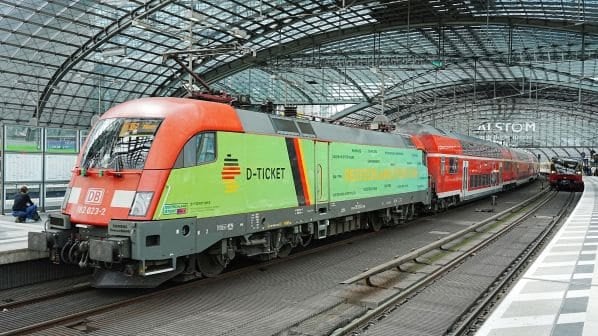GERMAN federal transport minister, Dr Volker Wissing, has told the state governments that the long-term future of the Deutschlandticket, providing unlimited travel on regional and local public transport across Germany for €49 a month, is under threat unless they can provide significant additional funding.
Major disagreements within the federal coalition government have been apparent for several months, with the three parties in the coalition split over the need to reduce national expenditure.
The economically liberal Free Democrat Party (FDP), in control of both the federal ministries for finance and transport, is seeking to reduce overall expenditure, following several years of substantial public spending during the Covid-19 pandemic, and more recently to mitigate the impact of rising energy prices following Russia’s invasion of Ukraine.
These disagreements may impact the public transport sector and in particular the Deutschlandticket. Despite widespread political support from all parties when it was launched earlier this year, serious questions about its future funding remain unanswered.
Around 10 million people used the Deutschlandticket subscription in July and August, representing around 15% of the adult population, with the number of subscriptions growing over the preceding months following its launch on May 1.
Market research suggests 42% of subscribers already had a public transport season ticket while 47% are new subscribers, but only 8% are new customers who did not use public transport before or only rarely.
The research also shows, perhaps unsurprisingly, that most holders of the Deutschlandticket live in towns and cities where public transport provision is more extensive.
2024 funding unclear
Wissing has caused widespread public annoyance amongst Germany’s 16 state governments by suggesting that the increased costs of the Deutschlandticket should in future be met by the states alone.
When it was introduced, the federal government announced additional funding of €1.5bn, to be matched by the states, on top of existing federal transport funding of €10.9bn. It also offered to cover 50% of any excess costs for 2023 only.
The approach for 2024 was left undecided, leading to the current debate. Despite recent efforts led by federal chancellor, Mr Olaf Scholz, to bring together regional and federal government in what he calls a Deutschlandpakt to reinvigorate the country and spur economic growth, division has only increased.
Wissing has also said that it is for the states to fund any enhancements to the initial Deutschlandticket offer such as national standards for youth tickets or those for the unemployed. Despite the ticket being valid nationwide, regional variations do exist.
Some states have offered discounted tickets and others have not, although discounted tickets from out of state are accepted everywhere. This is neither economically nor politically sustainable in the long term, but there is sharp disagreement on how the necessary levelling up of ticket offers is to be funded.
It is now clear the relatively quick introduction of the Deutschlandticket did not allow sufficient time to put in place mechanisms for sharing revenue and costs, with the additional federal funding being used to cover any shortfall in 2023.
The state governments now appear to agree a clearing house system is needed to distribute revenue based on where holders of the Deutschlandticket live, along with standardised national rules for discounted tickets for students, the unemployed or other groups.
Wissing has told the state governments that the long-term future of discounted national ticket is under threat unless they find significant new funding. In particular, he has suggested that with the new national fare, the number of tariff associations across Germany that set public transport fares could be significantly reduced, although this process is already underway in some areas.
The federal transport minister has also made it clear the government sees digital sales via smartphones as the way forward and that the costs of selling tickets by other means, estimated at €2bn a year, must be substantially reduced.
Leading state politicians from a range of parties have reacted with fury at the suggestion that the federal government will provide no additional money in 2024, especially as rail operating costs are rising due to agreed wage increases.
Track access charges for regional passenger services will increase by 3% in 2024 and local fares are likely to rise substantially, such as in Berlin where a 6.7% increase has already been announced.
One option Wissing has yet to rule out is a major increase in the price of Deutschlandticket, although this would no doubt reduce take-up and the modal shift from the private car that the initiative was aiming to stimulate in the first place. It would also be politically unpalatable to the FDP’s coalition partners.

